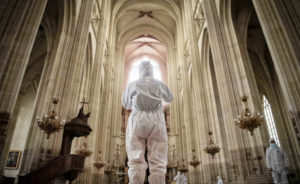Throughout history, the poets, the prophets and mystics have usually done a better job of predicting the future than pundits, politicians or scientists. Generally the reward for their perspicacity is to be ignored or laughed at, but luckily they are usually far enough from the centre not to notice or care.
The French mystic and thinker René Guénon, who was doing his best work nearly a century back, was one of them. In his two books (The Crisis of the Modern World and The Reign of Quantity and the Signs of the Times), Guénon laid out his notion that the modern world had deteriorated into a realm of pure materialism as a result of what he called the “Western deviation” from eternal truth. He called this the “reign of quantity”, and predicted its future collapse. But Guénon was not simply talking economics or politics. What was going on, he said, was something akin to a spiritual war, and as a Sufi Muslim he wasn’t shy about naming its antagonist. To this age, he wrote, “the word ‘Satanic’ can indeed be properly applied”.
Presenting disorder as order and truth as lies — this, wrote Guénon, was the way that Satan rolled. The “more or less direct agents of the Adversary”, he explained, using the Biblical name for what Europeans would later come to call the Devil, always aimed to invert reality. Right is wrong, black is white, up is down, there is no truth, do what thou wilt: this has always been the Adversary’s line, and today it is prominent in all quarters.
The heterodox Catholic philosopher Ivan Illich, who died in 2002, also believed we were living in the time of Anti-Christ, but for different reasons. For Illich, any claims that we lived in a “secular age” were nonsense. The modern West was still Christian, he said, but it had disastrously attempted to codify the spontaneous expressions of love which Christ had shown to be God’s desire for humanity within systems and institutions. First the Church, and then the supposedly “secular” liberal states which had succeeded it, had attempted to transmute Christian love into obligation and enforce it by law, thus twisting it into a new form of oppression. His biographer David Cayley explained in a recent essay that Illich’s work “emphatically rejects the idea that ours is a post-Christian era. ‘On the contrary’, he says, ‘I believe this to be the most obviously Christian epoch, which might be quite close to the end of the world.’”
A decade or so before Illich was writing, the Jewish Beat poet Allen Ginsberg was also attending to the dark spiritual undercurrent of the age. He had a different interpretation of its source — or perhaps he was just using a different name. In Howl, he identified the forward march of industrial modernity — and especially the hypocrisy and brutality of the American empire — with the pagan god Moloch, who demanded human sacrifice from his devotees:
Moloch whose mind is pure machinery! Moloch whose blood is running money! Moloch whose fingers are ten armies! …
Moloch whose love is endless oil and stone! Moloch whose soul is electricity and banks! Moloch whose poverty is the specter of genius! Moloch whose fate is a cloud of sexless hydrogen! Moloch whose name is the Mind!
Ginsberg, it seemed, could also sense that the spirit of his age was not under human control, either out in the world or in his own soul and mind. Usually this is easier to talk about in poetry or fiction, for the age doesn’t look kindly on anything which can’t be quantified. It can deal with Ginsberg, but it doesn’t want to talk about Moloch. It can just about cope with Christ if he has been brought down to our level — made into an activist or a defender of culture or a “cosmic” manifestation of the self — but it has nothing to say about Anti-Christ, who blows the whole story sky-high. As for St Paul’s famous notion that the world is subject not only to nature but to “principalities and powers” which wish us ill: this kind of talk was supposed to have been wrecked on the shores of the Enlightenment, never to be seen again.
But the powers and principalities didn’t die in the shipwreck of the old world, they just took on new forms. Today we can, in fact, still talk about these strange, underlying forces as long as we use the correct language. Take, for example, the Silicon Valley philosopher Kevin Kelly’s pet notion that technology has its own mind and its own purpose: that through the web of what he calls “the technium”, something is using us to create itself. Kelly sees technology growing into something self-aware and independent of its human creators, as he explained in his book What Technology Wants: “It may have once been as simple as an old computer program, merely parroting what we told it, but now it is more like a very complex organism that often follows its own urges.”
Other breathless Silicon Valley mavens, from Mark Zuckerberg with his Metaverse to Ray Kurzweil with his Singularity, regularly talk in the same register about where the technium is taking us. Our job, they seem to imply, is simply to service it as it rolls forward under its own steam, remaking everything in its own image, rebuilding the world, turning us, if we are lucky, into little gods.
They never consider where this story has been heard before. They never confront, or seem to even comprehend, what Illich or Guénon or even Ginsberg would have known, and which many a saint would confirm if they could hear the technium’s new story: that “AI”, on the right lips, can sound like just another way of saying “Anti-Christ”.
Maybe it’s just me, but the ongoing and rapid inversion of so much we have previously taken for granted increasingly seems to be happening independently of human action. It is as if something else has become manifest in some way we can’t quite put our finger on, and has stimulated the craziness of the times. Perhaps it has become self-aware, like Skynet; perhaps it is approaching its Singularity. Perhaps it has always been there, watching, and is now seizing its moment. Or perhaps it is simply beginning to spin out of control, as our systems and technologies become so complex that we can no longer steer them in our chosen direction. Either way, this force seems to be, in some inexplicable way, independent of us, and yet acting within us too.
Let’s give this force a name: a less provocative name, for now, than Moloch or Anti-Christ. Let’s keep it simple. Let’s just call this force Progress. Then, à la Kevin Kelly, let’s ask ourselves a simple question: what does Progress want?
The Italian philosopher Augusto Del Noce saw the modern era as a thorough and permanent revolution — a radical break with the human past. He defined a modern person as “someone who thinks that ‘today it is no longer possible’”. We do not tend to see our time as continuous with what has gone before, he said. Instead, we believe we live after a “violent break with history”.
In the story of Progress that informs us today, the revolutions of the modern age — industrial, political and intellectual — are assumed to have radically changed the world. By sweeping away old ways of thinking, seeing and living, modernity has produced “a type of violence capable of breaking the continuum of history”.
What Progress wants is the end of history.
Del Noce seems to be having something of a moment at present, provoked by a recent collection of his essays and lectures, translated into English as The Crisis of Modernity. This crisis, in Del Noce’s seeing, is one of exclusion: it is what the modern way of seeing leaves out that matters: “what is excluded is the ‘supernatural’, religious transcendence … For rationalists, certainty about an irreversible historical process … has replaced what for medieval thinkers was faith in revelation.”
The modern epoch, explained Del Noce, guided by science, reason and the self, rejects the notion of anything “unseen” or “beyond”. From the 18th century onwards, philosophy swept away religion: the world was now understood in purely human terms, and managed with purely human notions. Everything became immanent: literally, down-to-Earth.
All of this, said Del Noce, marks a radical transformation in human seeing. It is, for example, a “sharp break with respect to the Greek and medieval periods”. Both the followers of Plato and the followers of Christ (not to mention every other old culture on Earth, in their own particular way) believed that truth was transcendent, eternal and uncreated, and could be known through some combination of faith, practice and reason.
No longer, said Del Noce: the only “transcendence” that our age will permit is that which we create ourselves. With no ultimate truth or higher story, there is now nothing to stop us bending the universe to our desires: indeed, to do so is our duty. This, in Del Noce’s telling, explained 20th century history. Having replaced religion with philosophy, we then tried putting philosophy into practice on a grand scale, with terrible results.
How do we shape the universe in the age of immanence? According to Del Noce, “the spiritual power that in the Middle Ages had been exercised by the Church … today can be exercised only by science”. In this “totalitarian conception of science”, “every other type of knowledge — metaphysical or religious — expresses only ‘subjective reactions’, which we are able, or will be able, to explain by extending science to the human sphere through psychological and sociological research.”
But the rise of science did not lead to the end of religion, however much Richard Dawkins might like it to be so. Instead — as noted by Illich — religion responded to the challenge by becoming immanent itself. Western Christianity progressively abandoned its commitment to transcendence and was “resolved into philosophy”, allowing itself to be brought down to Earth, into the realm of social activism, politics and ideas. “The conversion of a large part of the religious world to the idea of modernity”, said Del Noce, “accelerated the process of disintegration” that the modern revolution had unleashed.
What Progress wants is the death of God.
But Man cannot live by immanence alone. Religion meets a human need, and when it is gone, or corrupted, the hole it leaves will have to be filled by something else. What will that be? Del Noce’s answer is: revolution. Modernity, he suggests, could be defined as a permanent, ongoing revolution.
The desire to build Utopia on the bones of the old world has been the consuming fire of Western thought for 300 years. Jacobins, Bolsheviks, communists, socialists, Fascists, Nazis, neoliberals and many more have all attempted to scour the ground clean and start again, and we are not done yet. “The revolutionary attitude of creative violence”, writes Del Noce, “has replaced the ascetic attitude of seeking liberation from the world”. If once society’s refuseniks imitated St Anthony, now they copy Che Guevara. All that is solid melts into air: this, in the words of its most consequential revolutionary mind, is the best description of the age of immanence that we have ever had.
What Progress wants is permanent revolution.
The two world wars of the 20th century — which Del Noce prefers to view as a single European conflict, lasting from 1914 until 1945 — spread this revolution against transcendence and tradition all around the world. After 1945, America, unchallenged monarch of the reign of quantity, took on the global responsibility for waging “the Enlightenment’s war against their own past”. Del Noce agreed with another prophet, Simone Weil, that “the Americanisation of Europe would lead to the Americanisation of the whole world” — and so it has proven. But Europe, by pursuing the path of pure immanence, had in any case already doomed itself, by turning on itself the weapons it had long used on others and hollowing out its own historic culture in the name of Progress: “Colonisation can be achieved by only one method: by uprooting a people from its traditions. Europeans have a long history of extensively practising this method (and this was Europe’s greatest historical fault). Now — oh, wonder! — in order to feign regret they are applying the same.”
Where would all this lead? The ultimate result of the revolution of modernity, predicted Del Noce, would be fragmentation, nihilism, and “the death of the sacred”. The twin revolutionary engines of the postwar era, he suggested, were scientism and sex. The first usurped the role of religion and culture, reducing all life to the level of the measurable and controllable. The second, via the sexual revolution of the 1960s and the resulting “permissive society”, unleashed a radical individualism cored around sexual desire, which would lead to the fragmentation of everything from nationhood to the family — but leave capitalism and its attendant class, the bourgeoisie, intact.
Modernity, in the final accounting, took aim at all authority, all tradition, everything rooted and everything past. Del Noce’s prediction, made decades ago, was that the end result of modernity’s revolutions would be the rise of a “new totalitarianism”. This time around it would not involve jackboots and uniforms. Instead, it would be a technocracy built on scientism and implemented by managerial elites, designed to ensure that order could continue after modernity had ripped up all former sources of authority and truth. Ironically, wrote Del Noce, “the rejection of authority, understood in its metaphysical-religious foundation, leads instead to the fullness of ‘power’”.
Create a void, in other words, and into it will rush monsters.
The new totalitarianism, suggested Del Noce, would “absolutely deny traditional morality and religion”, basing its worldview instead on “scientistic dogmatism”. It would negate all “spiritual forces”, including those which, in the 1930s, had been used to resist the totalitarianisms of Hitler and Stalin: “the Christian tradition, liberalism, and humanitarian socialism”. It would be a “totalitarianism of disintegration”, even more so than Russian communism, which had presented itself to some degree as a continuation of national tradition. This time around though, “the complete negation of all tradition”, including that of “fatherlands” — nations — would lead to rule by the only large institutions still standing: global corporations.
Faced with this challenge, Del Noce insisted that “current political formulas are completely inadequate”. Neither Left nor Right were equipped to understand what was going on: both, instead, would typically retreat to their historic comfort zones, with the Left blaming “fascists” and the Right blaming “communists” for the ongoing disintegration. The real source of the disintegration, though, was not partisan: it was the Machine.
What Progress wants is liberation from everything.
Progress. The Machine. Moloch. Anti-Christ. The Technium. We are all grasping here, trying to name something we cannot see, but whose impacts we can feel undermining the foundations of everything we have known. Augusto Del Noce’s analysis of the modern revolution — and the rootless, spiritless, immanent world it had produced — pointed to the ultimate destination as both totalitarianism and nihilism.
Kevin Kelly, of course, would disagree. For him and his fellow tech idealists, the clearing away of the transcendent realm is only a precursor to building another one — and getting it right this time: “Technology is part of a great asymmetrical arc that begins at the big bang and extends into ever more abstract and immaterial forms over time. The arc is the slow yet irreversible liberation from the ancient imperative of matter and energy.”
Del Noce is often referred to as a conservative or even a reactionary thinker, but he didn’t accept either label. Simple “reaction”, he said, was no solution to what was unfolding. Both nostalgia and utopia were ultimately fruitless as tools of resistance. If permanent revolution, and the consequent disintegration, is the baseline state of a world that denies transcendence, then the alternative is clear: a return to the spiritual centre. A rediscovery, or a reclamation, of the transcendent realm and its place in our lives. This, and only this, is the alternative to the reign of quantity and its attendant cast of gods, demons and machines.
What Moloch wants — Moloch whose soul is electricity and banks — is sacrifice. We must sacrifice ourselves and our children to the robot apartments and stunned governments. What Anti-Christ wants is the opposite of transcendence. If the coming of Christ represents the transcendent breaking into the temporal in order to change it, then His opponent will herald a world of pure matter, uninterrupted by anything beyond human reach. Everything in that world is up for grabs. Anything, from rainforests to the human body, can be claimed and reshaped in the interests of advancing the realm of the human will. It is the oldest story.
The rushing power that runs beneath the age of Progress, the energy of the modern world, the river that carries us onwards — where is it taking us? We know the answer. Humans cannot live for very long without a glimpse of the transcendent, or an aspiration, dimly understood, to become one with it. Denied this path, we will make our own. Denied a glimpse of heaven, we will try to build it here. This imperfect world, these imperfect people — they must be superseded, improved, remade. Flawed matter is in our hands now. We know what to do.
What Progress wants is to replace us.
Perhaps the last remaining question is whether we will let it.
A longer version of this essay first appeared at The Abbey of Misrule.
Disclaimer
Some of the posts we share are controversial and we do not necessarily agree with them in the whole extend. Sometimes we agree with the content or part of it but we do not agree with the narration or language. Nevertheless we find them somehow interesting, valuable and/or informative or we share them, because we strongly believe in freedom of speech, free press and journalism. We strongly encourage you to have a critical approach to all the content, do your own research and analysis to build your own opinion.
We would be glad to have your feedback.
Source: UnHerd Read the original article here: https://unherd.com






